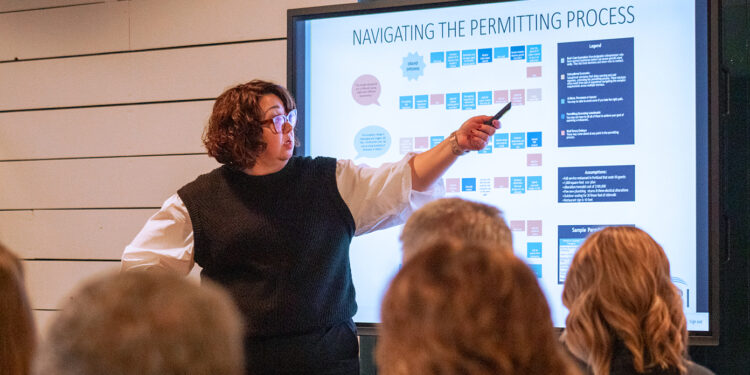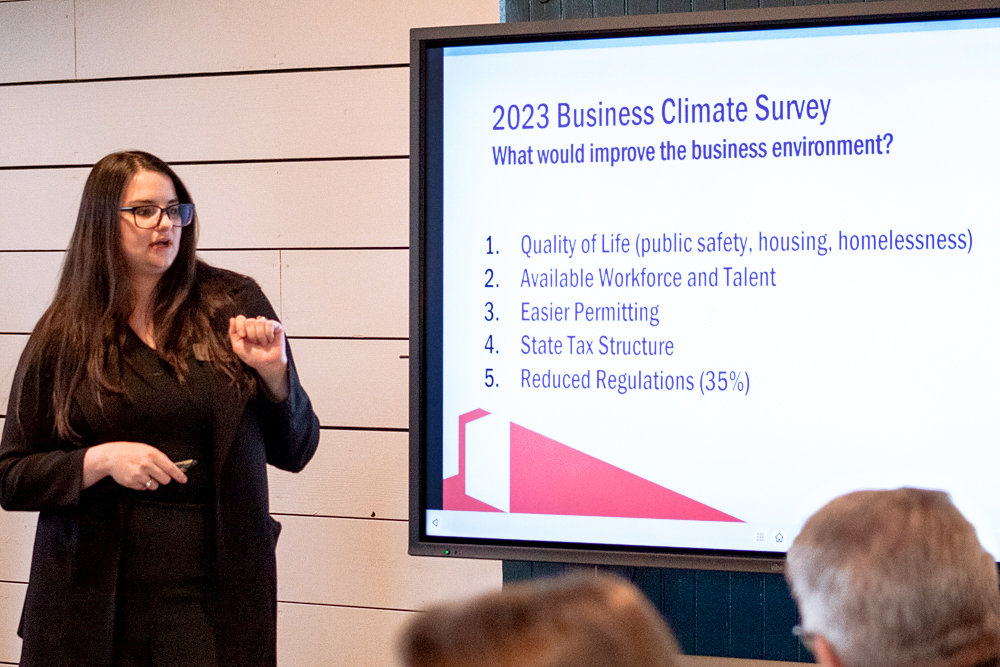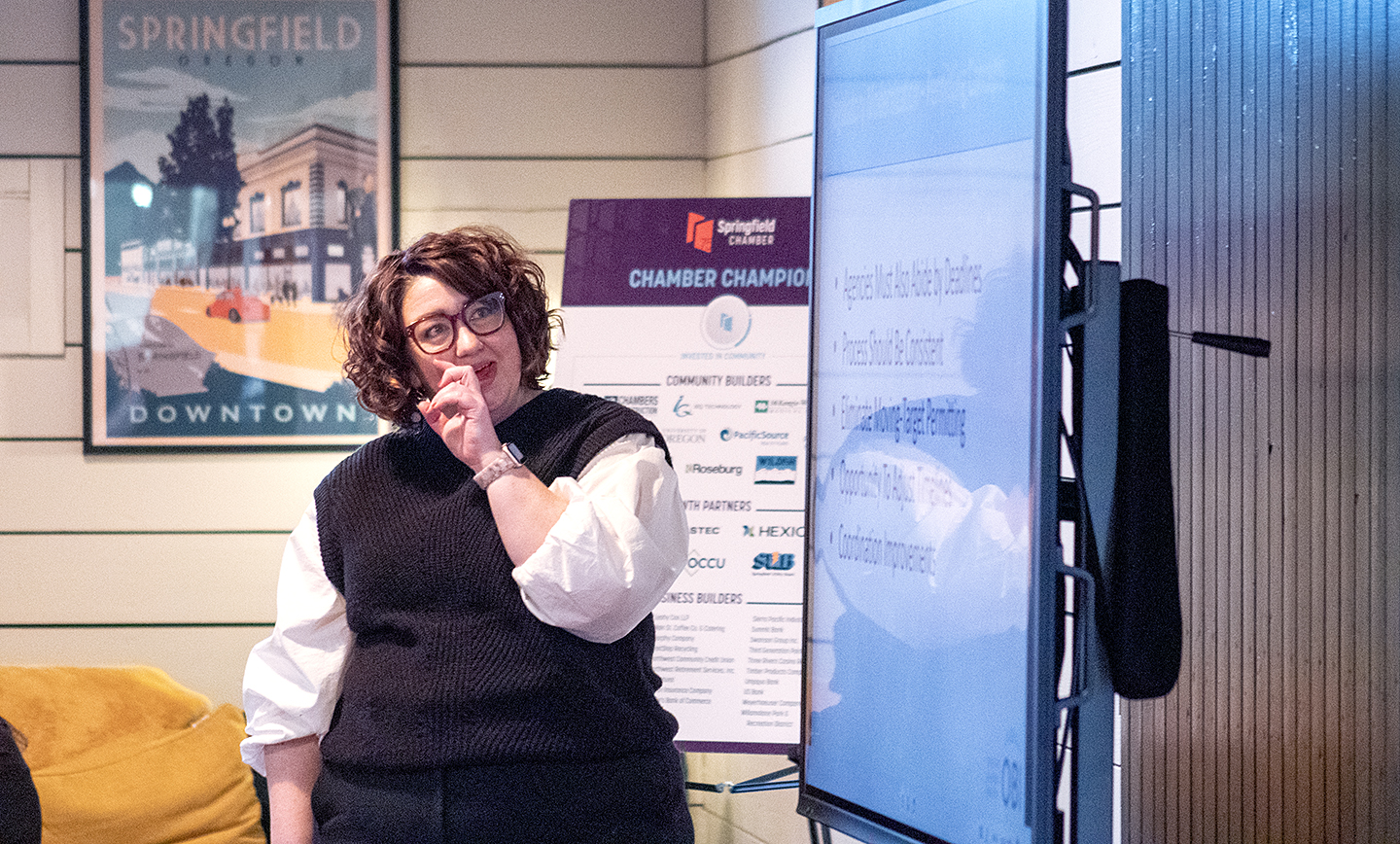February Roundtable Discusses Regulatory Environment for Oregon Businesses

The Springfield Area Chamber of Commerce‘s February Roundtable, entitled “Breaking Down Regulatory Barriers,” was well-timed. While good regulation helps us achieve strong quality of place, overreaching, difficult-to-navigate regulation is cost burdensome and fosters an unhealthy business climate. The Roundtable discussion, a joint program hosted by both the Springfield and Eugene Chambers at the Springfield Chamber Depot, coincided with the Oregon Business & Industry (OBI)‘s collection of feedback from Chambers across the state. This was an opportunity for local businesses to have a conversation about their experiences with local and state regulations, and provide feedback on OBI’s considered strategies for state-level change.
The program began with a short networking session. More than 30 business owners, city representatives, and members of both Chambers gathered in the freight room at the Springfield Chamber Depot.
Presentations
Paige Walters, the Springfield Chamber’s Director of Advocacy & Economic Development, began the program by showing attendees some results from the Chamber’s 2023 Business Climate Survey, where business members were asked about their top challenges to doing business in the area. Regulatory environment was identified as one of the top challenges for businesses of all sizes and types of organizations. Walters then introduced Paloma Sparks, OBI’s Chief Operating Officer and General Counsel.


Ms. Sparks’ presentation began with an overview of what OBI does, including advocacy, research, and education; and their 2023-24 priorities, focusing on economic vitality, stronger workforce, and barriers to success. She provided some statistics from OBI’s recent Small Business Survey, explaining that Oregon is at an inflection point, where the growth of business and the business sector are contingent upon regulatory reform. Of the Oregon small businesses surveyed:
74% say it’s hard to keep up with rapidly changing regulations;
71% say state agencies are more interested in finding wrongdoing than helping;
48% say they are comfortable calling state agency for help;
18% say state lawmakers care about the success of their businesses;
7% say the state’s business climate will improve in coming year.
Ms. Sparks went on to show, according to OBI research, how Oregon ranks compared to other states when it comes to “regulatory freedom” – that is, how difficult it is to start and maintain business ownership in Oregon – and what could be done to streamline the permitting process.

Roundtable Discussion
After the presentation by Ms. Sparks, the discussion portion of the program ensued, where at first, attendees discussed frustrations centered around achieving a common understanding between elected leaders and industry of the critical role business holds in creating a thriving economy, and the opportunity costs and impact of constantly changing and difficult-to-navigate regulations throughout layers of government. Some expressed that achieving a “culture of facilitation” throughout our regulatory agencies in lieu of the a “culture of administration” would make for a better experience for business owners.
As more attendees got involved, the conversation shifted toward a question of where the philosophies of the business sector and agencies that oversee regulatory processes might diverge. Short-term solutions to regulatory roadblocks were recommended and considered, like dedicated task forces or economic development staffers in key positions, that could help streamline the regulatory process. There was a robust discussion around the importance of local improvement endeavors and how those inform state-level efforts, and vice versa.


Takeaways
From OBI’s perspective, there is a two-pronged strategy that must involve 1) legislative action to modernize our regulatory processes across state agencies; and 2) systems in place that help business inform the executive branch of government, whether feeding information up through the regional solutions offices, or setting up some type of economic council to inform the governor’s office.
From an individual business perspective: unless the changes at a state level help enact process changes at a local level, we’re not going to be solving for the problem. There is work to be done in helping decision-makers understand the process and cost to comply with regulation (e.g., permitting), and where they have authority to make that process more efficient and less onerous.
This Roundtable comes at an early phase in an ongoing discussion that is essential to business and community health and prosperity. There will be continued opportunities to weigh in as strategies are developed for regulatory modernization going into the 2025 legislative session.
Business climate at local and state levels remains a priority of the Springfield Chamber and their members, and this includes the regulatory setting. Input from local and regional businesses is paramount as we support the development of strategies for modernizing the regulatory environment in Oregon.


Discover more from Springfield Bottom Line
Subscribe to get the latest posts sent to your email.






